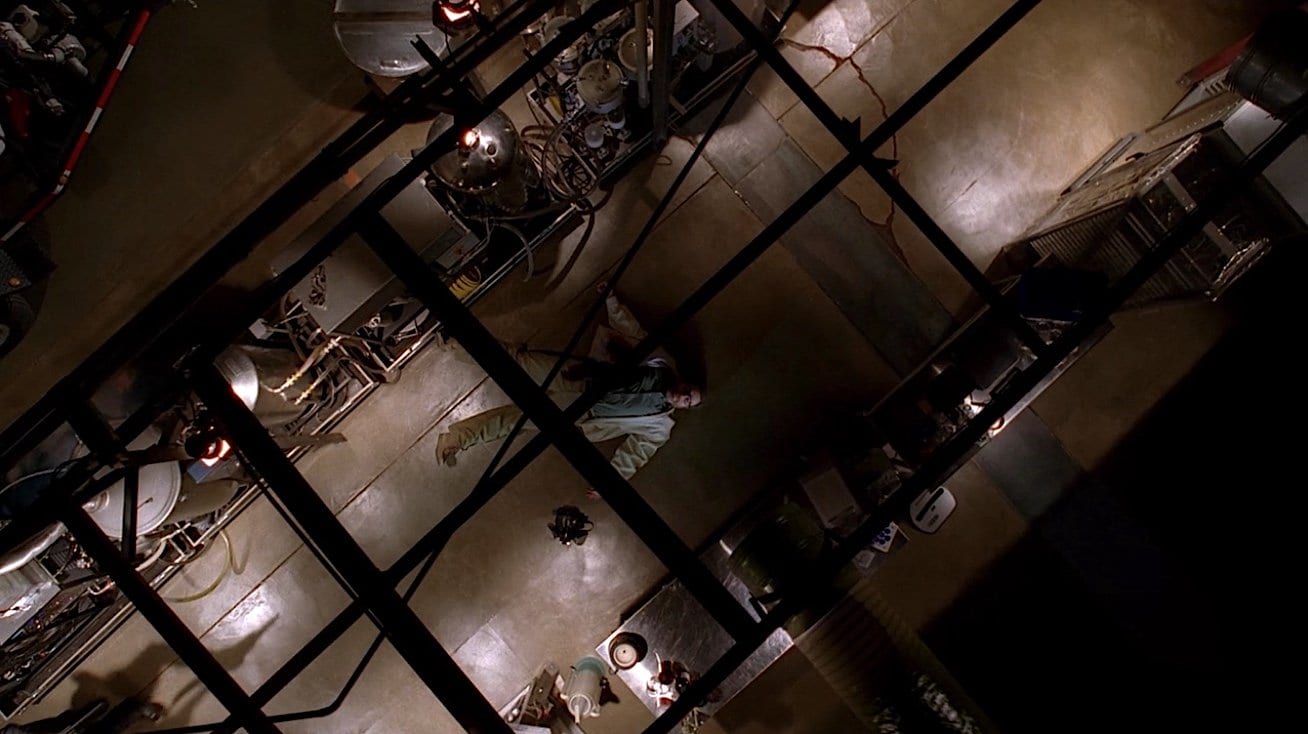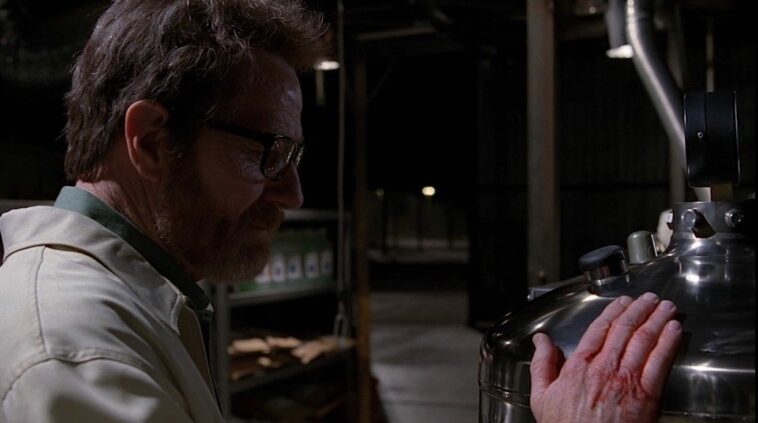Breaking Bad was never going to end well. Even without the flash-forward scenes of Walt’s return to Albuquerque scattered throughout the final season, any viewer of the series knew there would be no happy endings for anyone whose life touched Walter White’s. The three episodes leading up to the finale were a rollercoaster ride of death and destruction, and by the time we reach the end of the line and “Felina” (S5E16) begins, all our main characters’ lives are in ruins.
Hank and Gomez are dead and rotting in an unmarked grave in To’hajiilee. Marie has lost her husband but has no closure, and is left with the impossible task of repairing her relationship with the sister who she holds (at least partially) responsible. Skyler is left holding the bag for Walt’s crimes and will be tried as an accessory despite his attempt to give her plausible deniability via his vicious phone call in “Ozymandias” (S5E14). It’s up in the air as to whether she will serve prison time but even if she doesn’t, her life is in shambles. The feds took her house, she is infamous as Heisenberg’s wife and lives in fear that the Neo-Nazis or some other angry associates might harm her family, and her children are fatherless. I’m not sure who is worse off: Flynn, who is old enough to fully understand what Walt did, or Holly, who will grow up without a father only to learn—probably at far too young an age—that the man she never knew was a monster.
As for the guilty ones, they’re not in great shape either. Saul gets off the easiest and is able to skip town with the help of the Disappearer. (Of course, we learn in Better Call Saul that he takes on the identity of Gene the Cinnabon Manager in Omaha, Nebraska, which for Saul Goodman may be a fate worse than death.) And then there’s Jesse, enslaved by the Neo-Nazis, forced to watch them murder Andrea and leave Brock motherless, and spend his days cooking meth and waiting for the day they decide he’s of no more use and kill him.
Walt himself is rotting away in a cabin in New Hampshire with no contact with the outside world (save a few supply visits from the Disappearer) and his cancer back in full force. The great, all-powerful Heisenberg is dying, slowly and alone; he may have gotten away, but at what cost? He has no family. He has no empire. All he’s got is one barrel of his cash, but he has no way to get it to his family. It’s something Walt struggles and fails to accept until a daring call to Flynn—who wants nothing to do with him or his money—makes it clear to him that it’s all over. Knowing that the call he placed to Flynn’s school would be traced back to the bar in New Hampshire, Walt calls the DEA and effectively turns himself in. He’s ready to give up and face the music—that is, until he sees Gretchen and Elliott on TV, talking about how he contributed nothing to Gray Matter Technologies except the company name. His utter narcissism won’t let it stand and so he changes his mind. He will not sit at the bar drinking whiskey and waiting to be hauled off in cuffs; he will return to Albuquerque for his last stand, determined to take his revenge before he dies.
This is where “Felina” begins.
We find Walt in a snow-covered car, hiding from the police. They don’t find him and (almost too conveniently) he finds the car keys tucked in the driver’s side sun visor. And so he’s off on his cross-country journey back to Albuquerque. Along the way, he stops for gas and places a phone call, pretending to be a New York Times reporter looking to do an article on Gretchen and Elliott in order to get information on when they’ll be home and their address. At this point Walt is so desperate and has held a grudge against the Schwartzes for so long that it’s not inconceivable that he means to do them harm, but that’s not what he’s after. No, he means to use Gretchen and Elliot as a way to get his ill-gotten gains to his family.
At this point, the only way that Walt can even remotely redress his resentment toward Gretchen and Elliott is to make them complicit in his crimes (and scare the shit out of them in the process). He shows up at their house, lurking in the shadows as they have an incredibly pretentious conversation about the merits of various upscale New York City restaurants and a potential trip to Napa Valley. The eternally self-involved Schwartzes are unaware that Walt is wandering around their immaculate home, taking in the wealth that oozes from every inch of the place, which is likely only fueling his desire to get even with them in whatever way he can. They are allowed to flaunt their wealth while he was forced to hide his in barrels in the desert; they can live a life of luxury, complete with dinners at the 21 Club and Per Sé, while he couldn’t buy a bottle of champagne or a car for his son without coming up with elaborate cover stories. Walt is determined to use Gretchen and Elliott’s wealth against them, which he does in the form of threatening their lives and forcing them to create a trust for his children with the $9,720,000 he has left.
One thing that Breaking Bad consistently did so well was to break the near-constant tension with darkly comic moments, and there is one moment in this scene—when Elliott raises the world’s tiniest knife at Walt—that never fails to make me laugh. While not a bad guy, Elliott is completely insufferable, and his meek attempt to defend himself against the more menacing and dangerous Walt is a great, if brief, moment of hilarity in what is an otherwise tense interaction. After all, on first viewing we don’t know for sure that Walt won’t snap and kill them should they not agree to his demands. We don’t know right away that the “hit men” pointing their laser sights on Gretchen and Elliott are just everyone’s favorite knuckleheads Skinny Pete and Badger (another one of the moments of comic relief in “Felina”). All we know is what Walt tells them: they must get the money to his children or they die. This, he tells them, is their chance to “make it right.”
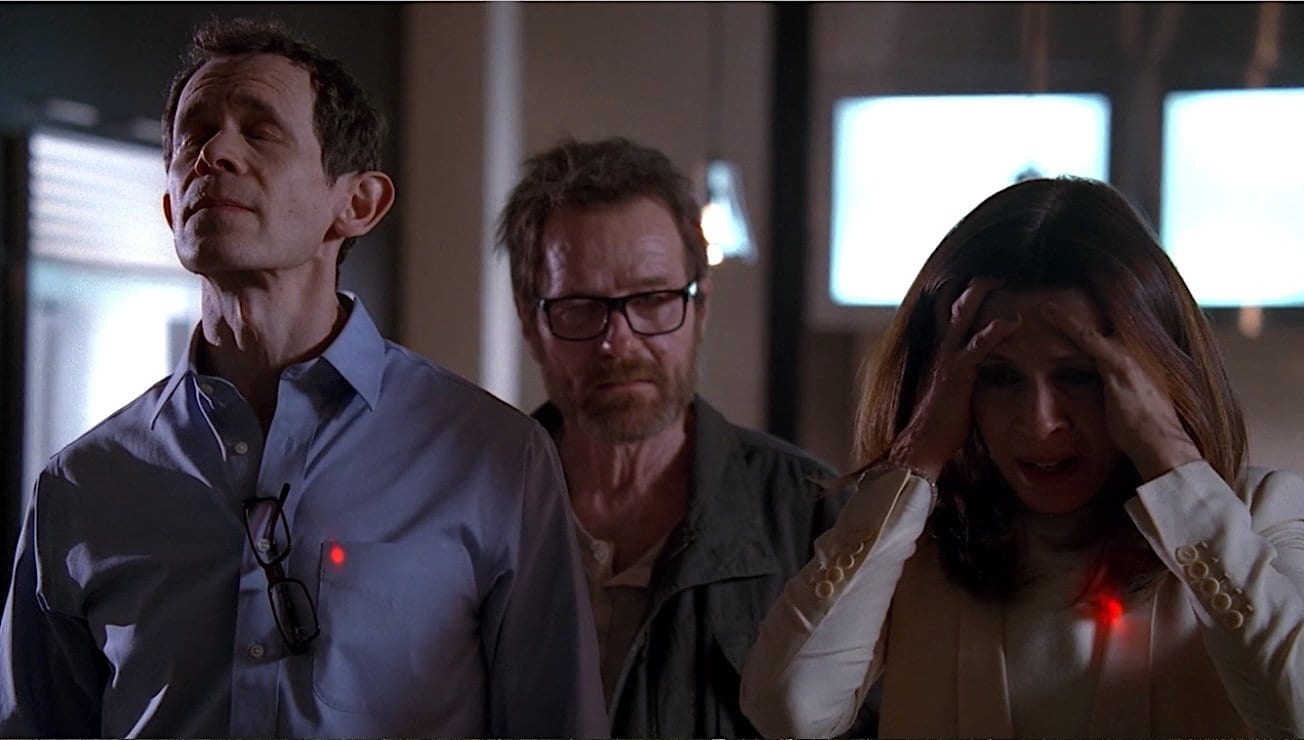
Up until the very end, Walt is convinced that Gretchen and Elliott have wronged him, that they are living the life he should have been living all those years, and that they owe it to him to take his dirty money and wash it clean for his family. Though “Felina” finally sees Walt being honest with himself (and with Skyler) about his motivations for entering the drug business, to the very end he refuses to admit that it was his own choices that took him away from Gray Matter and all the success that would have come with it. He never accepts that one particular truth: that he jumped ship early for personal reasons and only regretted it once the company became successful. In Walt’s mind, the Schwartzes stole his life and his legacy and part of his end-of-life revenge fantasy is to make them (literally) pay for it.
After his visit to Gretchen and Elliott, Walt returns to the car to pay Skinny Pete and Badger and asks after the blue meth. He learns from them that it is still being sold and is just as good as ever—so good, in fact, that everyone believed that Heisenberg was still cooking it. This leads Walt to (correctly) assume that Jesse is still cooking, although he is unaware of his circumstances. Meanwhile, Jesse is still living his personal hell, chained up and cooking meth for the Neo-Nazis. His only comfort is daydreaming about creating a stained wooden box like the one he made in shop class in high school (but traded for an ounce of weed).
A brief interlude in the middle of “Felina” makes great use of the flash-forwards from earlier in the season, which ties the timeline of events together nicely. We see Walt having breakfast at Denny’s on his 52nd birthday—the same footage used in “Live Free or Die” (S5E1)—firmly establishing the date of Walt’s last stand: September 10, 2010, exactly two years from the Pilot. “Felina” skips over Walt’s exchange with Lawson the gun dealer, but we do see the machine gun in his trunk. In more flash-forward footage—this time from “Blood Money” (S5E9)—we head over to the White residence where Walt is picking up Chekhov’s ricin from its hiding place inside the electrical socket in his former bedroom. He surveys the wreckage of his home, with HEISENBERG spray-painted on the living room wall, and this is intercut with footage from the pilot: a scene from Walt’s 50th birthday party, starring the dearly departed Hank Schrader. Walt is remembering this particular moment, two years earlier, in the same room, before everything fell apart. He remembers Hank’s warning—“It’s easy money, ‘til we catch you”—and his ultimately fatal offer to take Walt for the ride-along that set all future events in motion. With Hank’s death still fresh and raw for the viewer, the use of this footage, however brief, is heart-wrenching.
With the timeline of previous footage established, we see Walt confronting Lydia and Todd in the diner and part two of Walt’s revenge fantasy is underway. Before I get into this, let me just pause and say that, even though I believe the Breaking Bad finale to be one of the greatest of all time, this gives me pause. How on earth could Walter White, the nation’s most wanted criminal, possibly go unnoticed in broad daylight in his own hometown? Yes, he has hair and a beard, but still—it’s a little too convenient, just like the keys in the car at the beginning of the episode was a bit too convenient. There are certain things in this episode that only work because we, as an audience, just let them slide. Breaking Bad as a series has earned that kind of loyalty from its viewers, but I would be remiss not to at least mention it.
After casually sitting nearby while Todd and Lydia have a meet-up, Walt pulls up a chair to have a little chat with his former associates. Lydia panics, because of course she does, but Walt manages to get her to stop squirming long enough to listen. Walt rightly assumes that they are running low on their methylamine and proposes a new method of cooking which he is willing to teach Todd. He claims he’s doing it because he needs the money and even though Todd is wary, Lydia says she wants to bring it to Jack. She has no intention of doing business with Walt, of course; it’s just an easy way to kill him off and tie up that particular loose end, but Walt has likely assumed as much. It doesn’t really matter, though, because Walt gets what he’s after: access to the Neo-Nazi compound, and access to Lydia’s tea.
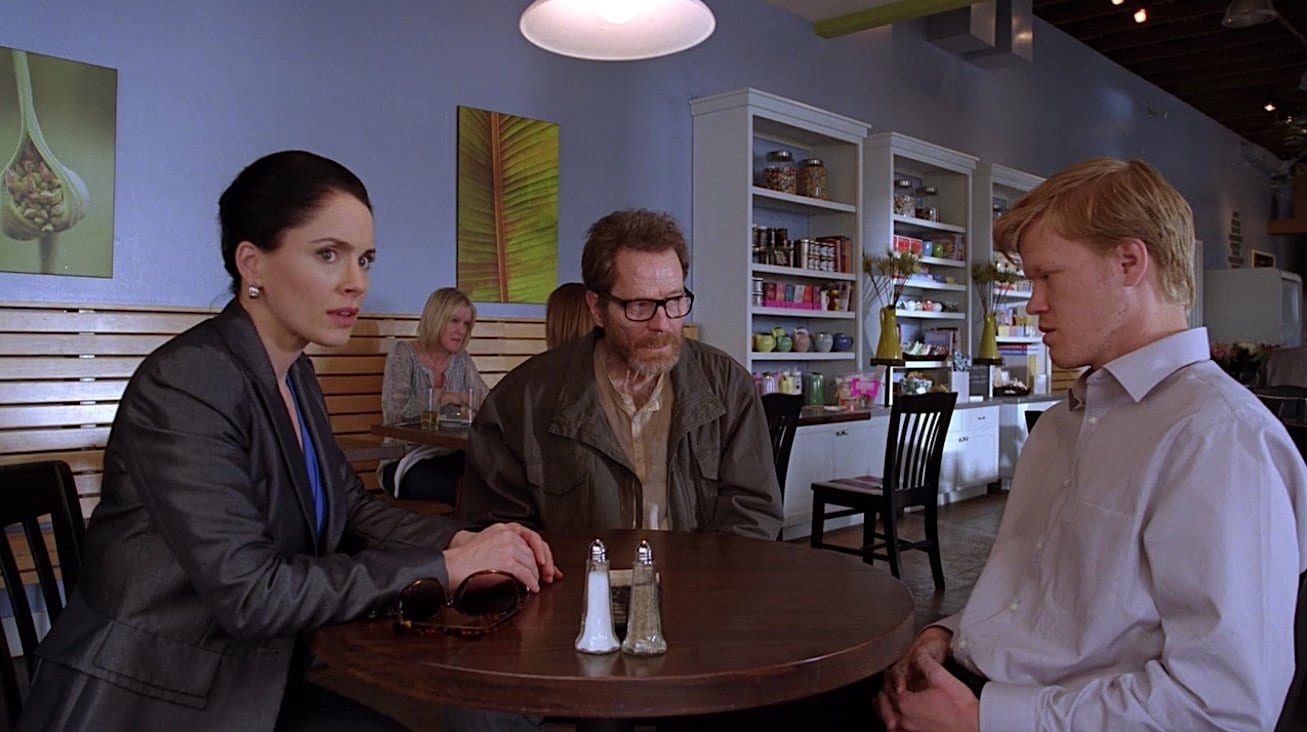
We don’t yet know it but, after seasons and seasons wondering about the endgame of that damn ricin, isn’t it just so perfect that it ends up in Lydia’s Stevia? Of all the ways Walt has killed people over the years, this is my favorite. It is a very fitting way to take out control-freak Lydia: nonviolent but just as deadly, much like Lydia herself. The over-cautious, no-loose-ends Lydia gets killed by her own obsessive need for an organic sugar substitute.
After spending some time out in the desert to MacGyver up the machine gun in the trunk, Walt pays Skyler a visit. The reveal of Walt in this scene is brilliant. We hear Marie leaving a message on Skyler’s answering machine, calling for a truce, and when Skyler picks up Marie tells her that Walt is in town and there are anonymous tips coming in that he’s going to bomb this and that place, which Marie assumes is a ploy to stretch the authorities thin so that he can get to either herself, Skyler, or Flynn. She tells Skyler to be on the lookout and there is genuine sisterly love and concern there, despite all they have been through. Skyler looks beat down and worn out and absolutely exhausted, and when she hangs up the phone the camera pushes in to reveal that Walt has been standing in the kitchen the entire time, obscured by a pillar.
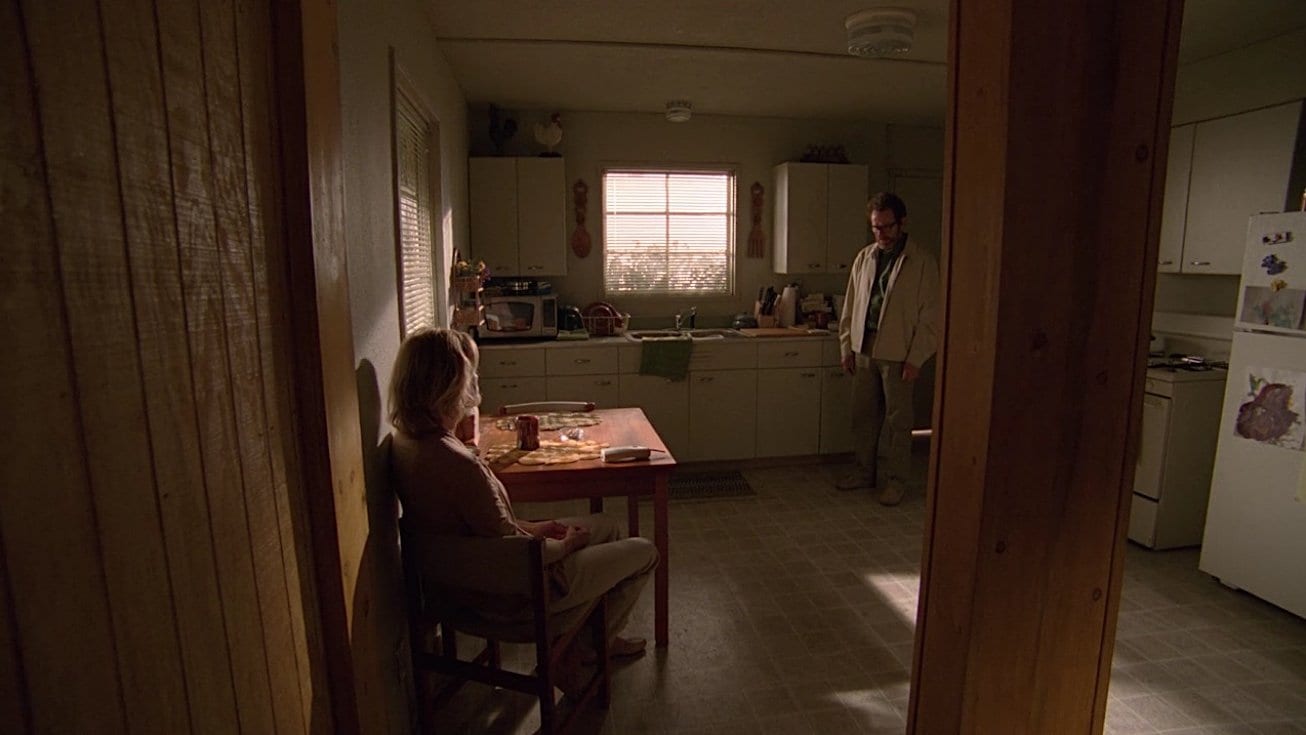
This scene, for me, absolutely makes the finale because it answers the question of Walt’s motivations once and for all. This is the first honest conversation he has had with Skyler maybe ever and he finally admits that he didn’t do it all for the family—as he claimed time and time again—but for himself. Walt speaks the words that finally put an end to years of bullshit rationalization when he tells Skyler, “I did it for me. I liked it. I was good at it. And I was…really…I was alive.” It is one of several kindnesses he does her in this scene, and the least impactful on her life, but I think it is the most important one in terms of her own peace of mind.
He also gives her the lottery ticket with the coordinates for Hank and Steve’s bodies so that the family, Marie especially, can finally have some closure and they can have a proper burial. It will also likely be enough of a bargaining chip for Skyler to cut a decent deal with the DA. There are very few things that Walt can make right with his family at this point but he does what little he can. Of course, no one will forgive him, and he’s not asking for or expecting forgiveness. He is doing it, quite simply, because it is the right thing to do and it is long past time he actually did right by his family.
Skyler allows him to see Holly one last time, a kindness she does not have to extend to him, but which she does anyway. Holly is too young to know any better so it can’t hurt her as it would hurt Flynn to see him again. As far as Flynn goes, Walt knows better than to approach him when he gets off the school bus, not just because the police are watching but because he’s on his honesty tour and part of that honesty is accepting the fact that his son hates him and never wants to see him again. The only kindness he can do Flynn at this point (besides the money from Gretchen and Elliott) is to just die already.
And that’s the real endgame in Walt’s revenge fantasy, but not before he takes a bunch of very deserving people down with him. He shows up at the Neo-Nazi compound more than ready to die, but first he needs to take his final revenge on the men that stole his money, killed his brother-in-law, and put the final nail in the coffin of his dream of getting away with it all. It’s more than that, though. For Walt, the fact that—of all people—a group of dumb racist rednecks were the ones that got the best of him just cannot stand. He would have accepted Hank being the one to take him down, and he did accept it until Jack and his crew showed up. In Walt’s mind, Hank was a good man and a worthy adversary, but he sees Jack, Todd, and the rest of them as so far beneath him both intellectually and morally that he cannot and will not let them win. Of course, Walt’s opinion of himself is always too generous—even at the end when he’s being somewhat honest with himself—but still, the Neo-Nazis are objectively terrible people and deserve every bullet they get.
There’s one last piece of unfinished business for Walt: Jesse Pinkman. He accuses Jack of partnering with Jesse after he’d promised to kill him, but Jack brings Jesse in to show Walt that, though he may be cooking for him, they are most certainly not partners. This gives Walt the opportunity to grab his key fob and prepare himself for action. When Walt sees Jesse he can see the absolute misery he’s been put through. Their relationship has always been intense and complicated, and at various times they have both tried to kill the other, but Walt has always had a soft spot for Jesse. When he walked into that room he may have wanted Jesse dead, but seeing him in the flesh changes his mind. He tackles Jesse to the ground, shielding him with his own body, and triggers the machine gun.
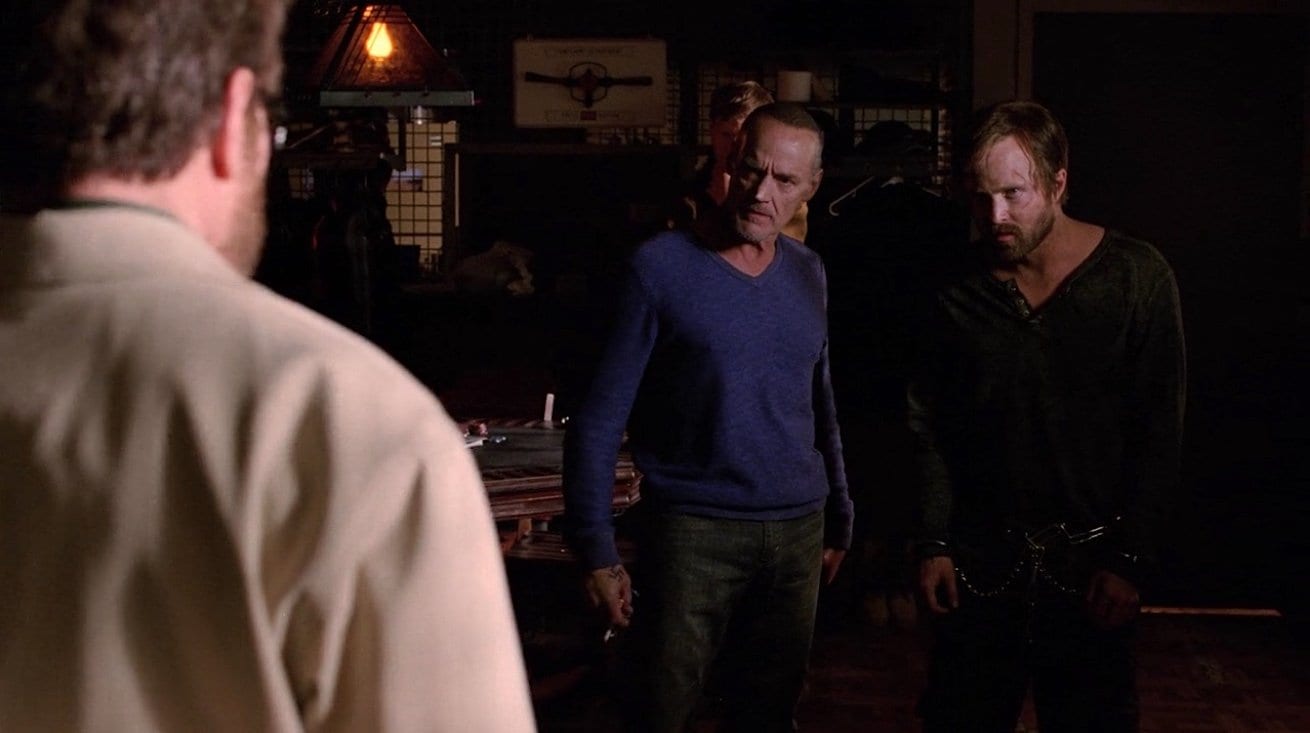
It’s fitting that in Walt’s journey “from Mr. Chips to Scarface,” everything ends in a hail of bullets and mayhem. He may as well have screamed “Say hello to my little friend!” before he popped that trunk. If it wasn’t so gratifying to watch those scumbags get torn up I would say it was too on the nose, but there’s a lot of little things in “Felina” I’m willing to forgive because, in the end, the episode works as a whole and as a satisfying ending to the series.
Most of the guys are killed instantly but Todd manages to avoid getting fatally wounded, giving Jesse the opportunity to strangle him to death with the chains that bind him—a fitting end for Todd, who has been Jesse’s nemesis since he pulled the trigger on Drew Sharp. Jack is injured pretty bad but may have made it, and tries to negotiate with Walt by offering up information about his money, but Walt is past the point where he is motivated by greed and shoots Jack in the head before he can even finish his sentence.
That leaves two men standing: Walt and Jesse. Walt slides the gun over to Jesse, more than willing to let Jesse kill him, even wanting him to do it. He sees it as a gift to Jesse but Jesse needs from him what Skyler needed from him: honesty. Jesse needs him to say that he wants him to shoot him before he will do it, but even then he just can’t pull the trigger. Jesse has killed people but he was never a killer; Walt was always pulling the strings. This time, he won’t be manipulated by Walt and he tells him to do it himself. After Jesse walks out of the clubhouse, Todd’s cell phone rings; it’s Lydia, calling to see if they took care of Walt, and Walt gets the pleasure of telling Lydia that she’s dying and he is the one killing her. While not nearly as bad as the Neo-Nazis, it is equally satisfying to see Lydia get what was coming to her. Just because she went out of her way not to get her hands (or her Louboutins) dirty, doesn’t mean she didn’t deserve it.
In the parking lot, Walt and Jesse have one final exchange—just a nod of heads, a silent goodbye—before parting ways for good. Jesse speeds off to parts unknown and his story ends with a giant question mark. However, with a Jesse-centric Breaking Bad movie in the works, it seems we will soon learn more about Jesse’s fate. With the other question mark—Saul’s fate—being explored in Better Call Saul, the expanded Breaking Bad universe looks like it will answer the few questions “Felina” did not.
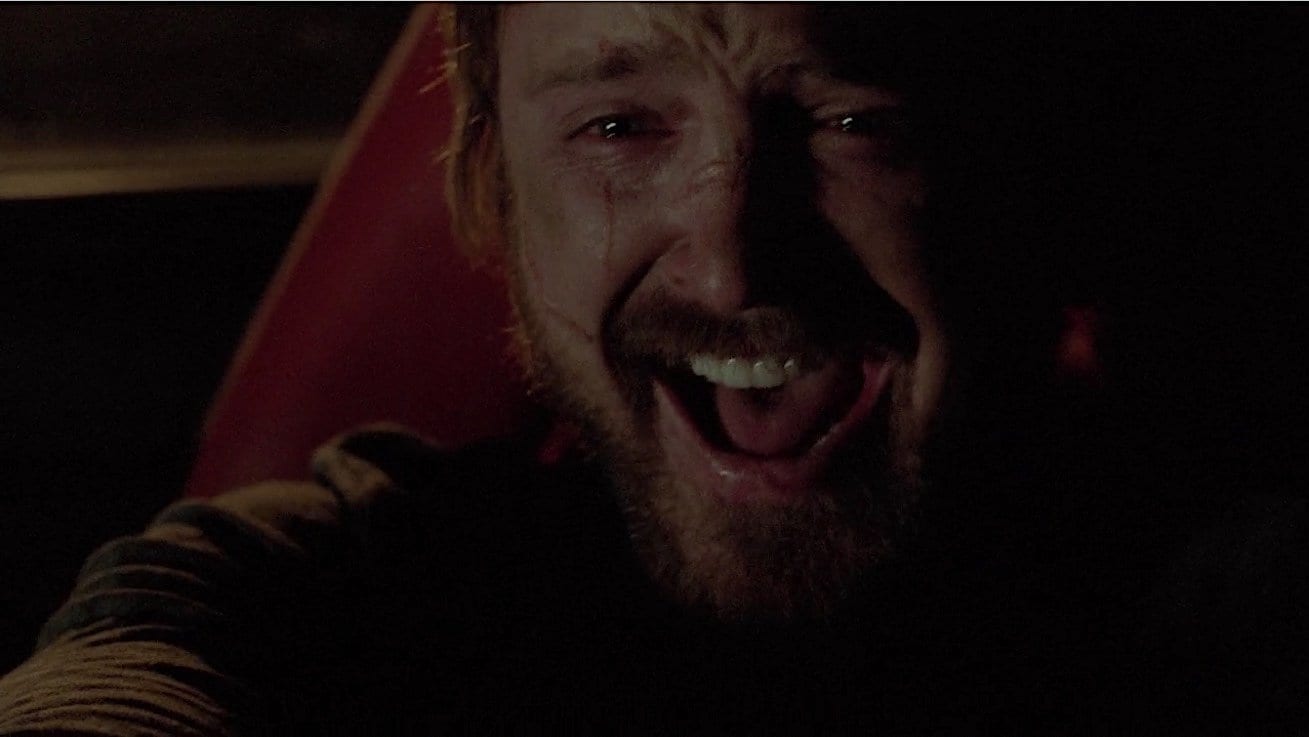
As for Walt, who has taken a bullet to the abdomen, it’s time to go. And where else would he go but the lab? He lovingly caresses the equipment as police sirens wail in the background and the final musical selection soars: Badfinger’s “Baby Blue.” Again, a bit on the nose considering the whole “blue sky” meth thing, but between Bryan Cranston’s acting, Vince Gilligan’s directing, and that spectacular final shot of Walt sprawled on the floor as the cops move in on him, it all just works.
Walt dying alone among meth lab equipment after vanquishing the last of his foes is the perfect ending for him. He doesn’t deserve to win. He doesn’t deserve forgiveness, and at the end he doesn’t want it. All he wants is to do right by his family in the very few ways he can, take his final revenge on the few people he hasn’t killed yet, and then die. After all that has happened, it would have been incredibly unsatisfying for Walt to be caught by the police—not that he didn’t absolutely deserve it, but because Hank is no longer alive to see it. It should have been Hank, and because it could no longer be Hank, Walt’s death was the only satisfying option for the viewer. However, death at the hands of anyone else would not have been satisfying, especially at the hands of Jack or Todd or one of the other lackeys. Jesse killing Walt would not have worked because it wouldn’t have been the right thing for Jesse’s character. Since the cancer wasn’t going to kill him fast enough and Walt is far too proud, even at the end, to commit suicide, the only option was for him to catch one of his own bullets—probably not what Walt intended (I think he really thought Jesse would kill him) but better in the long run.
To me, a great series finale wraps up the storylines of all its main characters in a satisfying (but not necessarily happy) way. An open-ended finale, a la The Sopranos, would never have worked for Breaking Bad (and, arguably, didn’t work for The Sopranos). The experience of watching Breaking Bad demands closure and “Felina” gives the viewer what we need: the end of Walt’s story being the end of Walt’s life. The episode stays with Walt the entire time; everything we see in this episode is from Walt’s perspective, something rare for Breaking Bad, which usually jumps around among its main players. But this is the final chapter in the saga of Walter White and so it’s fitting that we stay with him throughout. We need to see and feel the last days of his life for the finale to have the kind of impact it needs to have. Even though Breaking Bad did an excellent job of fleshing out all its main and even secondary characters, in the end it is Walter White’s story. We need to spend this last hour with him to remind ourselves that it is the end of the line for Walt, and for the series. Luckily for us, they both went out on their own terms.
